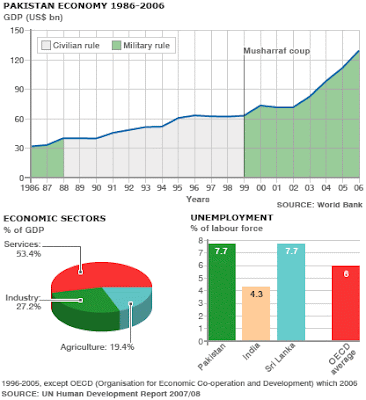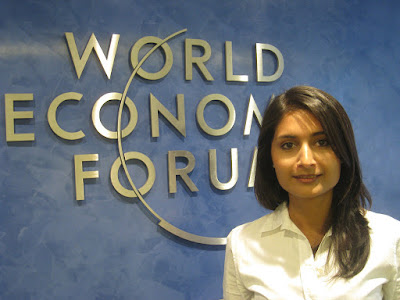Jinnah Democracy Institute For Good Governance in Pakistan
Why has democracy not taken root in Pakistan? Why have the nation's democratic institutions failed to sustain themselves? How can Pakistan build and strengthen democratic institutions that provide good governance to solve its problems? Is it entirely the fault of Pakistan's ambitious military generals who have ruled the nation for about half of its 60 year history? Or does it have anything to do with the poor performance of the politicians who have had the opportunity to govern for thirty years, and failed to solve most of its major problems, particularly those related to human development and industrialization?
There are many answers to the questions above. But the explanation that appeals to me most is the one offered by British writer William Dalrymple. He wrote for the Guardian as follows on Pakistan's 60th independence day:
"There is a fundamental flaw in Pakistan's political system. Democracy has never thrived here, at least in part because landowning remains almost the only social base from which politicians can emerge. In general, the educated middle class - which in India seized control in 1947, emasculating the power of its landowners - is in Pakistan still largely excluded from the political process. As a result, in many of the more backward parts of Pakistan the local feudal zamindar can expect his people to vote for his chosen candidate. Such loyalty can be enforced. Many of the biggest zamindars have private prisons and most have private armies."

While I do see the middle class clout increasing in Pakistan after a decade of economic growth and increasing urbanization during Musharraf years, I don't believe that middle class rise in politics alone can help build and sustain good democratic governance. Incessantly talking about building democratic institutions is not enough. What is needed is the building of competence through good governance education for members of democratic institutions such as the executive, the legislature and the judiciary.
Pakistan does have the British legacy of functional institutions such the nation's military and the bureaucracy which have been able to sustain the state. The members of the civil and military services have the basic educational facilities, such as a number of staff colleges and academies, for training them to do their jobs. As a result, the military and civil service officers are reasonably competent in carrying out their assigned responsibilities.
However, no such training exists for the politicians who get elected to the highest positions of leadership in the executive and legislative branches. Under the constitution, they are charged with appointing judges and making and executing laws and policies to solve the nation's problems. Yet, most of them lack the basic competence to understand and appreciate their responsibilities. The parliamentarians are usually uninformed about most of the key issues of governance brought for discussion on the floor. As a result, the level of parliamentary debate is very poor, and important budget priorities and policies are agreed, and laws are passed without fully taking into account all of the issues involved.
There is no effective system of drafting legislation, holding hearings with stakeholders and experts, making budget appropriations, and subsequent oversight by specialized parliamentary committees. People who chair such committees don't have much of a clue as to where to begin, what questions to ask, and how to hold the executive and the bureaucracy accountable. As a result, once the laws and policies are approved, and budgets passed, there is not much oversight or accountability.
There was a proposal in 1998 to set up Jinnah Democracy Institute, named after Pakistan's founding father Quaid-e-Azam Mohammad Ali Jinnah, who spoke eloquently about democracy when he told military officers, “Never forget that you are the servants of the state. You do not make policy. It is we, the people’s representatives, who decide how the country is to be run. Your job is to only obey the decisions of your civilian masters.”The idea for democracy institute was inspired by the John F. Kennedy School of Government at Harvard University in the United States, and its main purpose was to offer at least one semester of required training to Pakistan's elected representatives. Unfortunately, the proposal has not gone anywhere.
If the current crop of elected politicians are really serious about strengthening democracy, it is important for them to pursue a broad good governance agenda in Pakistan with education and training of politicians as the center piece. It is important for them to revive the idea of a school of government in Islamabad to increase the chances for democracy to survive and thrive in Pakistan. Unless the politicians find a way to improve governance to solve people's problems, the nation will be condemned to repeat the past history of democracy's failure in Pakistan.
As a Pakistani-American wishing to see a healthy and friendly US-Pakistan relationship of one democracy with another, I believe this is an opportunity for the United States to use its aid and influence with leadership in Islamabad to build competence and institutional capacity for good democratic governance in Pakistan. Helping Pakistan set up Jinnah Institute of Democracy, along the lines of Kennedy School of Government, could become a significant step forward in promoting good governance and sustaining democracy in Pakistan. This may or may not work, but it is certainly worth a try.
Here's a video clip of British Writer William Dalrymple talking about Pakistan:
Related Links:
Incompetence Worse Than Graft in Pakistan
Quaid-e-Azam Mohammad Ali Jinnah's Vision
Good Governance Reform Agenda in Pakistan
Pakistan – build institutions, civil society, to avert state failure
Feudal Power Dominates Pakistani Elections
Middle Class Clout Rising in Pakistan
Pakistan Most Urbanized in South Asia
Pakistan's Human Development
There are many answers to the questions above. But the explanation that appeals to me most is the one offered by British writer William Dalrymple. He wrote for the Guardian as follows on Pakistan's 60th independence day:
"There is a fundamental flaw in Pakistan's political system. Democracy has never thrived here, at least in part because landowning remains almost the only social base from which politicians can emerge. In general, the educated middle class - which in India seized control in 1947, emasculating the power of its landowners - is in Pakistan still largely excluded from the political process. As a result, in many of the more backward parts of Pakistan the local feudal zamindar can expect his people to vote for his chosen candidate. Such loyalty can be enforced. Many of the biggest zamindars have private prisons and most have private armies."

While I do see the middle class clout increasing in Pakistan after a decade of economic growth and increasing urbanization during Musharraf years, I don't believe that middle class rise in politics alone can help build and sustain good democratic governance. Incessantly talking about building democratic institutions is not enough. What is needed is the building of competence through good governance education for members of democratic institutions such as the executive, the legislature and the judiciary.
Pakistan does have the British legacy of functional institutions such the nation's military and the bureaucracy which have been able to sustain the state. The members of the civil and military services have the basic educational facilities, such as a number of staff colleges and academies, for training them to do their jobs. As a result, the military and civil service officers are reasonably competent in carrying out their assigned responsibilities.
However, no such training exists for the politicians who get elected to the highest positions of leadership in the executive and legislative branches. Under the constitution, they are charged with appointing judges and making and executing laws and policies to solve the nation's problems. Yet, most of them lack the basic competence to understand and appreciate their responsibilities. The parliamentarians are usually uninformed about most of the key issues of governance brought for discussion on the floor. As a result, the level of parliamentary debate is very poor, and important budget priorities and policies are agreed, and laws are passed without fully taking into account all of the issues involved.
There is no effective system of drafting legislation, holding hearings with stakeholders and experts, making budget appropriations, and subsequent oversight by specialized parliamentary committees. People who chair such committees don't have much of a clue as to where to begin, what questions to ask, and how to hold the executive and the bureaucracy accountable. As a result, once the laws and policies are approved, and budgets passed, there is not much oversight or accountability.
There was a proposal in 1998 to set up Jinnah Democracy Institute, named after Pakistan's founding father Quaid-e-Azam Mohammad Ali Jinnah, who spoke eloquently about democracy when he told military officers, “Never forget that you are the servants of the state. You do not make policy. It is we, the people’s representatives, who decide how the country is to be run. Your job is to only obey the decisions of your civilian masters.”The idea for democracy institute was inspired by the John F. Kennedy School of Government at Harvard University in the United States, and its main purpose was to offer at least one semester of required training to Pakistan's elected representatives. Unfortunately, the proposal has not gone anywhere.
If the current crop of elected politicians are really serious about strengthening democracy, it is important for them to pursue a broad good governance agenda in Pakistan with education and training of politicians as the center piece. It is important for them to revive the idea of a school of government in Islamabad to increase the chances for democracy to survive and thrive in Pakistan. Unless the politicians find a way to improve governance to solve people's problems, the nation will be condemned to repeat the past history of democracy's failure in Pakistan.
As a Pakistani-American wishing to see a healthy and friendly US-Pakistan relationship of one democracy with another, I believe this is an opportunity for the United States to use its aid and influence with leadership in Islamabad to build competence and institutional capacity for good democratic governance in Pakistan. Helping Pakistan set up Jinnah Institute of Democracy, along the lines of Kennedy School of Government, could become a significant step forward in promoting good governance and sustaining democracy in Pakistan. This may or may not work, but it is certainly worth a try.
Here's a video clip of British Writer William Dalrymple talking about Pakistan:
Related Links:
Incompetence Worse Than Graft in Pakistan
Quaid-e-Azam Mohammad Ali Jinnah's Vision
Good Governance Reform Agenda in Pakistan
Pakistan – build institutions, civil society, to avert state failure
Feudal Power Dominates Pakistani Elections
Middle Class Clout Rising in Pakistan
Pakistan Most Urbanized in South Asia
Pakistan's Human Development



Comments
Denmark has launched a US$ 3.5 million a three-year new programme for Pakistan on democratic development and good governance. The programme, a joint collaboration with Pakistan Institute of Legislative Development and Transparency (PILDAT), was announced during the presentation of Pakistan Report of State of Democracy in South Asia an event organised recently by PILDAT with support of the Danish International development agency (Danida). An important feature of the new programnme is the engagement of youth in democratic processes and dialogue.
According to Denmark Ambassador to Pakistan Sorensen, this programme has a special focus on instilling democratic values in the youth through the Youth Parliament programme.
Under this programme, young people from across the country are trained in the values of democracy. This creates understanding, respect and tolerance for other people’s opinions – besides being an innovative approach to engage youth in such an important process, he added.
He said that Denmark is also providing support to primary education in the conflict affected areas.
“We are now also more focused on facilitating contacts between Danish and Pakistani businesses so that we can create jobs, growth and ultimately eliminate poverty”, he added.
Appreciating the Denmark support, PILDAT Executive Director Ahmed Bilal Mehboob said it is in everyone’s interest that we strengthen the democratic progressive forces in Pakistan, so that we do not leave the playing field to the radical forces.
He said through this programme, PILDAT will implement five projects including Assessment of the Quality of Democracy, Youth Parliament Pakistan, Citizens periodic Reports on the performance of state institutions such as the National Assembly, Provincial Assemblies and Pakistan Institute of Parliamentary Studies (PIPS) and processes such as the study of Civil-Military Relations and learning from international examples while maintaining close inter-action with national and provincial legislators from various parties, Comparative Assessment and Score Card on Quality of Governance in Federal and Provincial Governments and Development of Political Parties and leadership It may be mentioned here that the new PILDAT programme is a part of the overall US$ 50 million development programme for Pakistan, which was launched by the Government of Denmark in November 2013.
http://www.pakistantoday.com.pk/2014/02/16/city/denmark-to-spend-3-5m-on-pakistans-youth-parliament-programme/